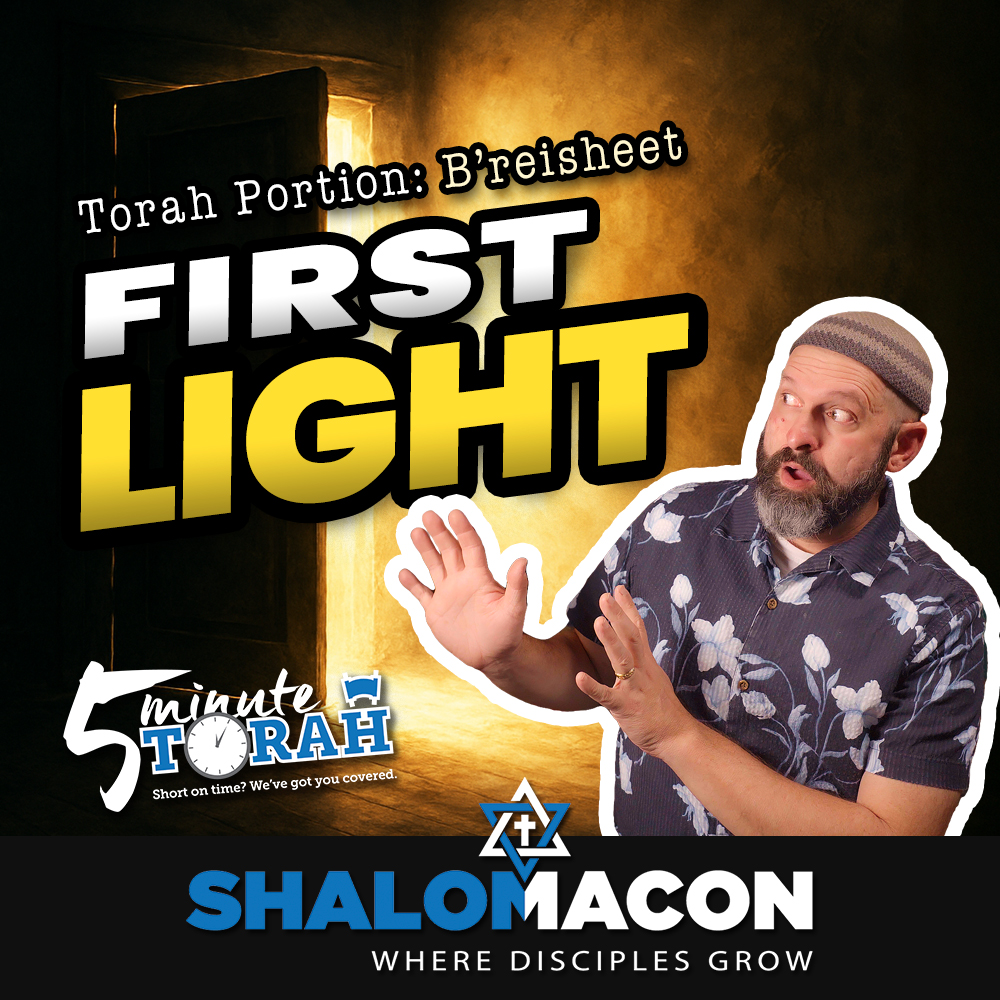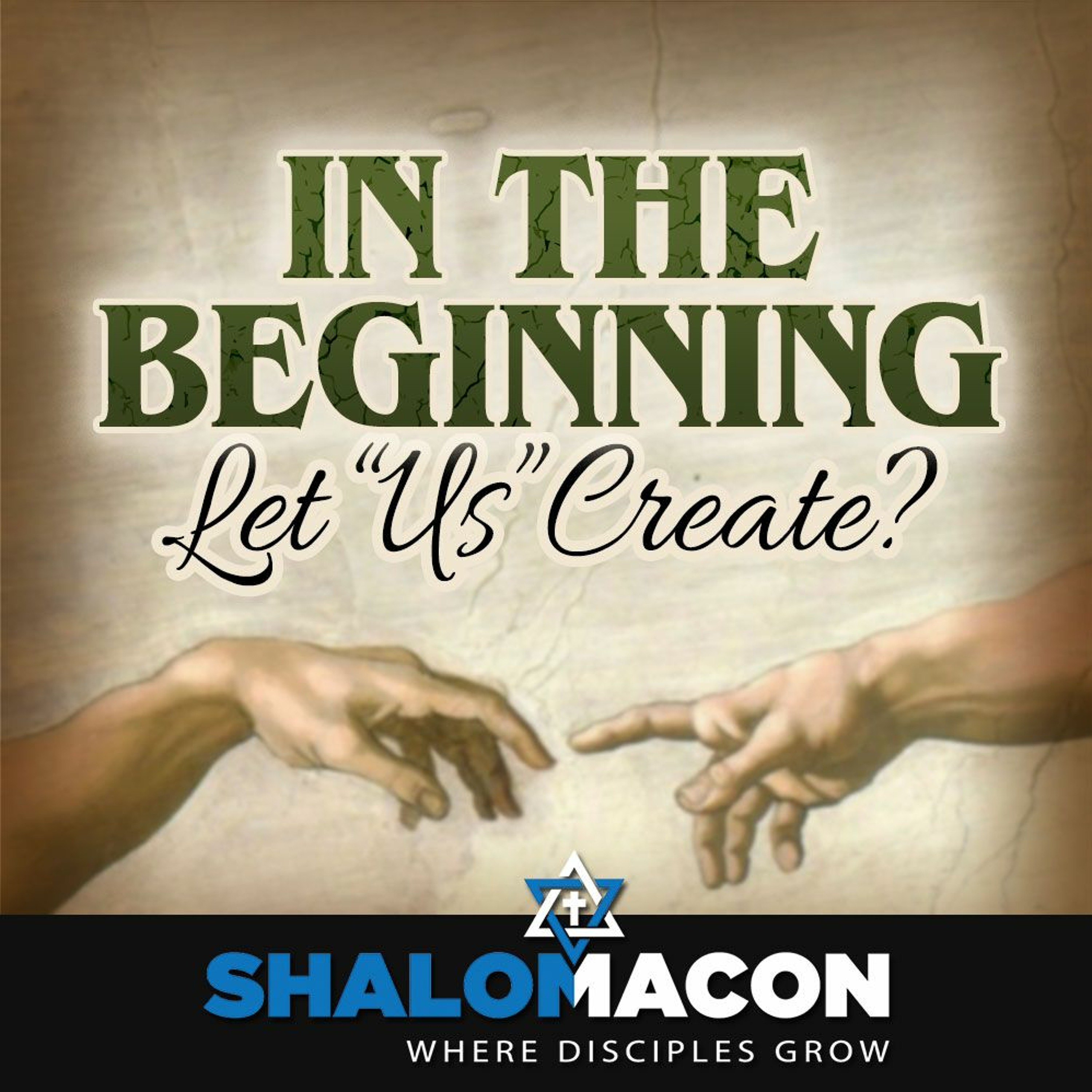Episode Transcript
[00:00:00] What's your name? I know this may sound like an odd question in a video where I can't hear the answer, but it's a serious question nonetheless. Names have meaning, and you've been given a name, an identity. I want you to think about that name for a moment. What traits do you associate with your name? With your identity? Character traits like purpose, success, motivated, content, etc. Or traits like purposeless, failure, lethargic, depressed, etc. If you've ever wanted a new name, a identity, and a new lease on life, then stick around to find out how you can receive one in this week's Five Minute Torah Shalom and welcome back to another exciting episode of the Five Minute Torah. I'm Darren, and before I get in my Torah commentary, I want to make sure you stick around until the end of this video because I'm announcing the winners of my eight Lights book giveaway right now. However, let's cover a few facts about this week's Torah portion. This week we are studying the portion of v Shelach Genesis 32:4 through 36:43 and here are the three things that you need to know about it. Number one Jacob meets Esau. A Reluctant reunion it had been more than 20 years since Jacob had seen his brother Esau, and the last thing Jacob had heard was that Esau was out to kill him. When Jacob got word that Esau was headed in his direction with 400 armed men, his fear went through the roof. So he came up with a plan. He sent Malachim ahead of him to try and appease his brother. Who were these Malachim? The Hebrew word Malachim can mean either messengers or angels. Which did he send? Good question. Thankfully, when Jacob finally meets his brother, they have a peaceful interaction. Esau offers to escort Jacob back to his camp to catch up on old times, but Jacob tells him to go ahead because his children and livestock will slow him down, basically saying, don't wait on me. You go ahead, I'll catch up with you later. Much later. Number two Shechem and a Tale of Revenge Eventually, Jacob purchased a plot of land near the city of Shechem and settled down. One day his daughter Dina decided she would go out and meet some of the local women. While she was out, she was kidnapped and taken advantage of by Shechem, son of Hamor, the Hivite. Hamor came to Jacob and proposed marriage between his son and Dina, asking what price he needed to pay for Dina. When her brothers heard about what was going on, they were little, vivid and rightly so they concocted a scheme saying that in order for Shechem to marry their sister and intermarry with their family, all of the men of the city had to be circumcised. Hamor and Shechem somehow got the men of the city to agree, and they were all circumcised. On the third day after their circumcision, when their pain had reached its highest point, Simeon and Levi came through the city with a sword and killed every single male and number three the Death of Rachel and the Birth of Benjamin Toward the end of our portion, Rachel, Jacob's cherished wife, tragically passes away while giving birth to her second and final son Benjamin near Bethlehem. Although she names him Benoni, which means Son of my suffering, after her death, Jacob renames him Benyamin, which means Son of the Right Hand, an ode to Jacob's affection toward his son. Rachel's untimely death deeply affects Jacob, and he erects a pillar at her gravesite to memorialize his beloved wife. The Torah says, so Rachel died and she was buried on the way to Ephrath, that is Bethlehem, and Jacob set up a pillar over her tomb. It is the pillar of Rachel's tomb which is there to this day. Israel journeyed on and pitched his tent beyond the Tower of Eder. This is Genesis 35:19 21. The phrase tower of Eder is migdal Eder. It means tower of the Flock. Hey, Hanukkah is right around the corner. If you want to have a great family experience for Hanukkah, be sure to pick up your copy of Eight Lights, my Hanukkah how to and Devotional that will make each night of Hanukkah a night to remember. It has nearly 150 five star reviews on Amazon and has consistently been in the top 10 bestsellers for the Messianic Judaism category in the weeks leading up to Hanukkah. And now it's available on Barnes and Noble as well. So if you want to have fun and learn to be a better disciple of our master Yeshua, then check out my book Eight Lights, using the link below. This week's Torah commentary is called A New Identity and comes from my book, Five Minute Torah Volume 3. This week's parashad, or Torah portion begins with Jacob preparing to head back home to the land of Canaan AFTER some 20 long years of working for his father in law, Laban. On the journey home, he's attacked by a mysterious figure during the wee hours of the night. As we know, Jacob spends the Night wrestling with what most people know as an angelic being. Just before dawn, the stranger asks Jacob's name. After he responds, the stranger replies, your name shall no longer be called Jacob, but Israel, for you have striven with God and with men and have prevailed. This is Genesis 32:29. From that point, there's a noticeable shift in Jacob. He begins a streak of name calling. Let me explain. First, the event that begins all the name calling is when Jacob is given the name Israel by the angelic being. Jacob then names that place Peniel, which means face of God, because he said, for I have seen God face to face. When he set up a temporary dwelling place for him and his livestock after his encounter with Esau, he named that place Sukkot, meaning booths or temporary dwellings. When he arrived safely at Shechem, he set up an altar to the Lord and called it Elohei Yisrael, which means God, the God of Israel. He then renames Luz el Betel, meaning the House of God, because God first appeared to him there during the night. When Deborah dies, he calls her burial site Alon Bakut, which means oak of weeping. This explains the Torah statement, she was buried under an oak in the same passage. After this, God appeared to Jacob at Padan Aram and confirmed that his name shall be called Israel. This section of naming concludes when Rachel struggled to give birth to her second son, and just before her death she named him Ben Oni, meaning son of my suffering. But Jacob didn't want that stigma attached to him and therefore renamed him Benyamin or Benjamin, which means son of the right hand. What is going on with all this name changing in our Torah portion? If we remember, it all started when Jacob underwent a transformation himself and his name was changed from Jacob to Israel. The name Jacob means something akin to follower or supplanter, as Scripture says. Afterward, his brother came out with his hand holding Esau's heel from the Hebrew word Ekev. So his name was called Jacob or the Hebrew Yaakov. This is Genesis 25:26, but Israel means one who struggles with God, as it says, your name shall no longer be called Jacob, but Israel, for you have striven with God and with men and have prevailed. It seems his identity shifted from one who is considered the tail to one who is considered the head. Jacob's new identity was the foundation of a unique people who would one day become a nation dedicated to the service of the Creator. In the apostolic scriptures, Yeshua does something similar with Simon Peter. In his first encounter with Yeshua, this would Be disciple's name is changed from Simon to Peter. Yeshua said to him, you are Shim'on or Simon, the son of John. You shall be called Kephas or Kephas, which means Peter. This is John, chapter 1, verse 42. The name Simon or Simeon or Shimon in Hebrew is related to hearing, as we read in Genesis 29:33. Because the Lord has heard, she called his name Simeon. The name Peter, however, means rock, from the Greek word Petros. Yeshua uses this meaning in a play on words when he tells him, you are Peter or Petros. And on this bedrock Petra, I will build my congregation, and the gates of hell shall not prevail against it. This is Matthew, chapter 16, verse 18. Both Jacob and Peter are radically changed by a divine encounter with the representative of the Lord. It affected everything in their life from that point forward. Just as Jacob and Peter were given a new identity one day the followers of Yeshua who resist the lure of idolatry and assimilation are given a new name as well. To the one who conquers, I will give a new name written on the stone that no one knows except the one who receives it. This is Revelation 2:17. Who are those who conquer? Those who hold onto both Yeshua and the commandments. See Revelation 14:12. Because we have been given a new identity and a new purpose. Have you been given a new name? A new identity? If not, you could do so through a personal connection to the God of Israel through Yeshua right now. With that new identity comes a new life. We become a completely new creation. See Second Corinthians 5:17. We also inherit a resurrection to eternal life. Yeshua said, for this is the will of my Father, that everyone who looks on the Son and believes in him should have eternal life. And I will raise him up on that last day. John 6:40. Have you received this new life? If not, what's keeping you from receiving your new identity today? That's all for now. Blessings from Shalom Akin, the place where disciples of Yeshua learn, connect, and grow.



